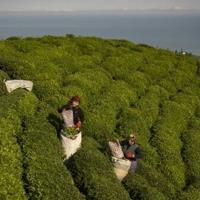Whenever heavy rainfall occurs in Turkey’s stunning Black Sea tea growing region, Zikrullah Komurcu becomes concerned.
Last August, he had a near-death experience when a mudslide occurred in the tea garden above his home in Abdullahhoca village during a downpour.
The house above his was destroyed, causing part of the field to end up in his kitchen.
“It’s truly a miracle that no one lost their life,” Komurcu shared with AFP, as an electricity pylon loomed precariously over his mud-covered home.
The province of Rize in northeast Turkey, known for its tea cultivation, has been plagued by significant landslides over the past five decades.
Experiencing almost double the rainfall of Ireland, with an annual average of 2.2 meters (86 inches), the Turkish disaster agency AFAD reported 355 major landslides impacting homes in the region last year alone.
Experts caution that the situation will deteriorate due to climate change causing the Black Sea to warm up, resulting in more intense rainstorms which further strain the soil.
– Hazardous monoculture –
Hakan Yanbay, from the province’s chamber of geological engineers, pointed out that the unregulated construction of roads connecting the scattered villages on mountainsides has aggravated the problem.
These constructions undermine the soil stability in the predominantly mountainous region, with 80 percent of it consisting of steep slopes.
Yanbay attributes much of the soil erosion to the expansion of tea plantations over the past century, representing a staggering 90 percent of the region’s agricultural land.
While Rize has not had any landslide-related fatalities in nearly three years, a tragic incident in March in neighboring Trabzon province resulted in the loss of three workers life 40 kilometers (25 miles) from Abdullahhoca.
Painful memories of previous disasters that claimed 130 lives in Rize since the 1960s still haunt the region.
“We are committed to preventing the floods and landslides that have plagued the Black Sea region for years,” vowed Turkish President Recep Tayyip Erdogan, who has ties to Rize, in April.
Following the deaths of six villagers in floods and mudslides in 2021, Erdogan called for a halt on constructing “five- to 10-storey buildings on hillsides.”
The president criticized the damage caused, specifically pointing out the deterioration of soil due to nitrogen fertilizers used in tea gardens.
– ‘Man-made disasters’ –
Despite this, Tahsin Ocakli, the sole opposition MP in the predominantly AK party-controlled province, laments the lack of substantial measures taken to address the issue in the last three years.
Ocakli, who has pushed for a parliamentary investigation, argues that the frequent occurrences in the region have transitioned from natural disasters to man-made calamities.
The Rize chamber of agriculture raised concerns about discounted nitrogen fertilizers being sold in February, warning of their adverse effects on the soil.
Experts highlight the shallow roots of tea plants as a contributing factor to the instability of the soil, suggesting the planting of trees like poplars and eucalyptus with deeper roots that can better absorb water.
To mitigate risks, authorities have initiated the construction of drainage channels and retaining walls beneath tea gardens. A concrete barrier has been placed to protect the nephew of Zikrullah Komurcu in Abdullahhoca.
Komurcu and his wife, Medine, await a similar barrier to shield their home, fearing the possibility of another landslide during heavy rainfall.
“Every time it rains, we worry about another landslide,” expressed Medine. “I can’t sleep anymore – we’re scared.”
rba/bg/fg





